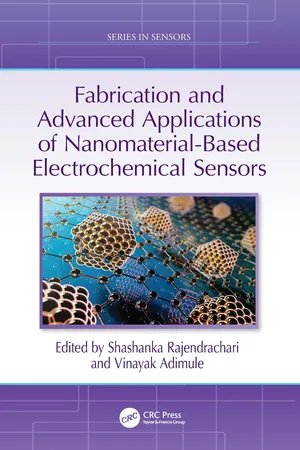
Fabrication and Advanced Applications of Nanomaterial-Based Electrochemical Sensors
- English
- ePUB (mobile friendly)
- Available on iOS & Android
Fabrication and Advanced Applications of Nanomaterial-Based Electrochemical Sensors
About this book
Fabrication and Advanced Applications of Nanomaterial-Based Electrochemical Sensors will help students understand the concept of nanomaterial-based electrochemical sensors easily by giving simple examples and illustrations. Electrochemical sensors can determine various bioactive compounds and organic molecules, but the further addition of nanomaterials into the electrode can increase the detection limit due to their excellent electrical and chemical properties and their huge surface area. Nanomaterial-based electrochemical sensors can also detect toxic waste and thereby reduce the risk of waterborne diseases to both humans and aquatic animals. This book seeks to enhance environmental awareness and explain how electrochemical sensors contribute to a more sustainable and conscious way of living. The book will be useful for researchers who are fabricating various nanomaterial-based electrodes to determine neurotransmitters, organics, toxic dyes, surfactants, and various bioactive compounds as well as engineering, chemistry, electrochemistry, and nanomaterial students at the undergraduate and postgraduate level.
Key Features:
- The first book to cover novel applications of nanomaterial-based electrochemical sensors
- Discusses various nanomaterials and composite materials as modifiers for the electrochemical determination of different dyes, pesticides, toxic chemicals, neurotransmitters, food additives, and heavy metals
- Describes the facilitation of nanomaterial-based electrochemical sensors as compared with other conventional modifiers
Frequently asked questions
- Essential is ideal for learners and professionals who enjoy exploring a wide range of subjects. Access the Essential Library with 800,000+ trusted titles and best-sellers across business, personal growth, and the humanities. Includes unlimited reading time and Standard Read Aloud voice.
- Complete: Perfect for advanced learners and researchers needing full, unrestricted access. Unlock 1.4M+ books across hundreds of subjects, including academic and specialized titles. The Complete Plan also includes advanced features like Premium Read Aloud and Research Assistant.
Please note we cannot support devices running on iOS 13 and Android 7 or earlier. Learn more about using the app.
Information
Table of contents
- Cover
- Half-Title
- Series
- Title
- Copyright
- Contents
- About the Editors
- List of Contributors
- Chapter 1 Advancement in Electrochemical Sensing Technology
- Chapter 2 How Nanomaterials Facilitated Electrochemical Sensor Research
- Chapter 3 How Nanomaterial-Based Electrochemical Sensors Are Used for Biomedical Applications
- Chapter 4 Fabrication of Electrochemical Sensors for Determination of Toxic Dyes
- Chapter 5 Advanced Electrochemical Sensing Devices For Analysis of Pesticides, Insecticides, and Other Toxins in Food Products
- Chapter 6 Recent Advances in Nanomaterial-Based Electrochemical Sensors for Pharmaceutical and Biomedical Diagnosis
- Chapter 7 Applications of Nano Electrochemical Sensors to Determine Vitamins and Hormones
- Chapter 8 Determination of Medical Wastes by Nanomaterial-Based Electrodes
- Chapter 9 Advances in Glucose Electrochemical Sensors Using Nanomaterials
- Chapter 10 How Nanomaterial-Based Sensors Contribute to a More Sustainable Environment
- Chapter 11 Limitations, Challenges, and Future Aspects of Electrochemical Sensing Devices
- Chapter 12 Advantages of Nanomaterial-Modified Electrochemical Sensors over Conventional Electrochemical Sensors
- Chapter 13 Carbon-Based Nanomaterials: Synthesis, Characterization, and Applications of Electrochemical Sensors and Biosensors
- Index